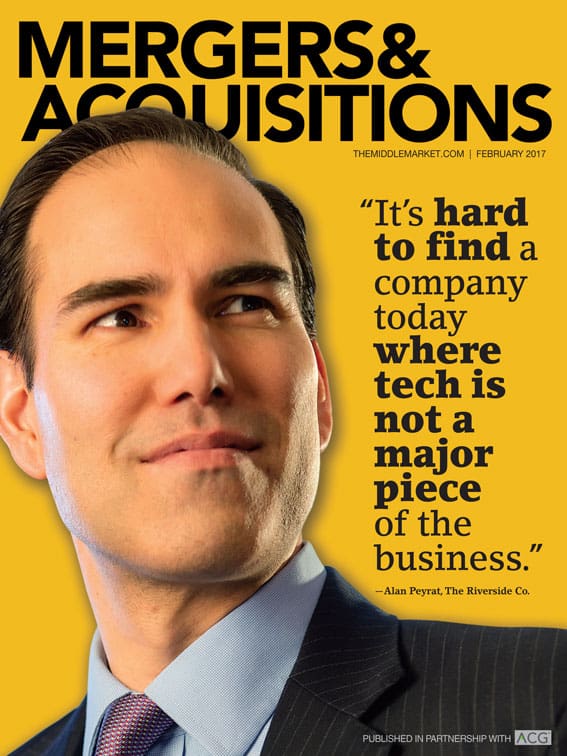 M&A involving technology is expected to soar in 2017, as we explore in our cover story. Activity is being driven by companies in a wide array of industries seeking to improve efficiency in business processes and increase protection against cyberattacks.
M&A involving technology is expected to soar in 2017, as we explore in our cover story. Activity is being driven by companies in a wide array of industries seeking to improve efficiency in business processes and increase protection against cyberattacks.
“The software industry is entering a new phase of secular growth as it expands into all segments of the economy,” says managing director Orlando Bravo, co-founder of Thoma Bravo, one of several tech-focused private equity firms that raised new funds in 2016.
“Technology, in and of itself, is invading every end market, and it is driving companies to be more competitive than their peers,” says Rich Lawson, CEO of HGGC, which closed its third fund in December. “What’s changed is the proliferation of a computer in everyone’s pocket. There’s a much more sophisticated end-user base, and that is driving change in how businesses will have to compete.” HGGC looks to invest in companies involved in updating end markets that are still steeped in outdated technology, such as grocery stores, car dealerships, marketing agencies and insurance providers.
Software-as-a-Service is playing a big role in dealmaking. “SaaS is now the predominant way to deliver software, for good reason,” says Alan Peyrat of the Riverside Co., which in 2016 increased significantly the percentage of tech-related businesses the firm backed. “There are two major benefits of SaaS. One is that the methodology to provide service from one centralized platform is much more efficient than the old paradigm of license maintenance, which meant multiple versions of software. The other benefit that is so attractive is the recurring revenue model. Instead of selling a license once and getting small residual fees for updates, SaaS provides a steady, predictable revenue model.”
Dealmakers expect the M&A activity in the tech sector to continue rise in 2017, according to Mergers & Acquisitions’ Mid-Market Pulse.
After clicking on a story, use the back arrow in your browser to return to your search results. Use phrases "in quotes" or the tools below to better filter your results.



